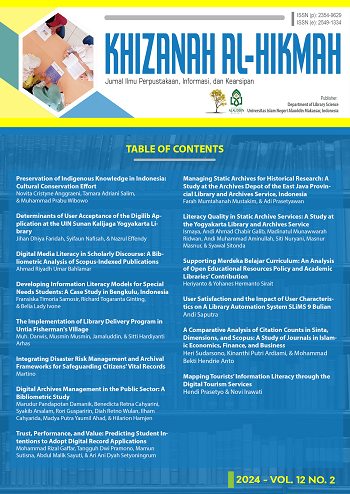Supporting Merdeka Belajar Curriculum: An Analysis of Open Educational Resources Policy and Academic Libraries’ Contribution
Abstract
In 2023, the Indonesian government launched the Merdeka Belajar (Freedom of Learning) curriculum to enhance the quality of education in the country. College libraries, as integral components of Indonesia's educational system, were called upon to support this initiative, particularly through the use of Open Educational Resources (OER). However, the development and implementation of OER encountered several challenges, including legal barriers. This study aimed to analyze the legal framework surrounding OER, with a particular focus on the Indonesian context. A mixed-methods approach was employed, involving the analysis of legal documents, policies, and relevant literature. The legal documents examined primarily included regulations pertaining to higher education, copyright laws, and licenses. The study found that the lack of specific regulation regarding OER in Indonesia created challenges in defining the applicable legal framework. Although OER practices align with copyright law, the absence of explicit regulation on open licenses places the legal basis on license agreements between creators or copyright holders and OER users. If the license agreement is valid, it becomes enforceable under the pacta sunt servanda principle. However, the study highlighted the need for comprehensive regulations to provide legal security and clarity for creators, copyright holders, and users of OER. It was recommended that the government issue more explicit legal regulations to support the creation, distribution, and use of OER, thereby providing a solid legal foundation for stakeholders, including lecturers, universities, and libraries.
Downloads
References
Agustine, I., Permatasari, K. M., & Robihim, R. (2023). Effectiveness of Open Educational Resources in Increasing Japanese Writing Skills. International Journal of Educational Research & Social Sciences, 4(2), 276-280. https://ijersc.org/index.php/go/article/view/617
Ammann, O. (2020). Domestic Courts and the Interpretation of International Law: Methods and Reasoning Based on the Swiss Example. Brill.
Colvard, N. B., & Watson, C. E. (2018). The Impact of Open Educational Resources on Various Student Success Metrics. International Journal of Teaching and Learning in Higher Education, 30(2), 262–276. https://eric.ed.gov/?id=EJ1184998
Danver, S. L. (2016). Open Educational Resources. In The SAGE Encyclopedia of Online Education. https://doi.org/10.4135/9781483318332.n277
Fischer, L., Hilton, J., Robinson, T. J., & Wiley, D. A. (2015). A multi-institutional study of the impact of open textbook adoption on the learning outcomes of post-secondary students. Journal of Computing in Higher Education, 27(3), 159–172. https://doi.org/10.1007/s12528-015-9101-x
Fitriayu. (2020). Sumber Pembelajaran Terbuka Sebagai Salah Satu Bidang Penerapan Lisensi CC. https://id.creativecommons.net/2020/02/06/sumber-pembelajaran-terbuka-sebagai-salah-satu-bidang-penerapan-lisensi-cc/
Harliansyah, F. (2020). Mempromosikan Open Educational Resources Untuk Memperkaya Sumber Pembelajaran di Perguruan Tinggi di Indonesia. Al-Maktabah, 19(2). https://journal.uinjkt.ac.id/index.php/al-maktabah/article/view/24153
Iswanto, R. (2021). Open Educational Resources (OER) dan Penerapannya pada Perpustakaan Institut Agama Islam Negeri Curup. Tik Ilmeu : Jurnal Ilmu Perpustakaan Dan Informasi, 5(1), 79. https://doi.org/10.29240/tik.v5i1.2772
Law Number 12/2012 on Higher Education of the Republic of Indonesia.
Law Number 28 of 2014 on Copyright (2014) of the Republic of Indonesia.
Norris, M. E., Swartz, M., & Kuhlmeier, V. A. (2023). The importance of copyright and shared norms for credit in Open Educational Resources. Frontiers in Education, 7(January). https://doi.org/10.3389/feduc.2022.1069388
Reed, J. B., & Jahre, B. (2019). Reviewing the Current State of Library Support for Open Educational Resources. Collection Management, 44(2–4), 232–243. https://doi.org/10.1080/01462679.2019.1588181
Scharf, N. (2017). Creative Commons-ense? An analysis of tensions between copyright law and Creative Commons. Journal of Intellectual Property Law and Practice, 12(5), 376–383. https://doi.org/10.1093/jiplp/jpx023
The Minister of Education, Culture, Research, and Technology Regulation Number 53/2023 on Quality Assurance of Higher Education (2023).
Vhalery, R., Setyastanto, A. M., & Leksono, A. W. (2022). Kurikulum Merdeka Belajar Kampus Merdeka: Sebuah Kajian Literatur. Research and Development Journal of Education, 8(1), 185. https://doi.org/10.30998/rdje.v8i1.11718
Wiley, D., & Hilton, J. (2018). Defining OER-Enabled Pedagogy. International Review of Research in Open and Distributed Learning, 19(4). https://doi.org/https://doi.org/10.19173/irrodl.v19i4.3601
Yunanto, Y. (2019). Hakikat Asas Pacta Sunt Servanda dalam Sengketa yang Dilandasi Perjanjian. Law, Development and Justice Review, 2(1), 33–49. https://doi.org/10.14710/ldjr.v2i1.5000
Copyright (c) 2024 Heriyanto Heriyanto, Yohanes Hermanto Sirait

This work is licensed under a Creative Commons Attribution-NonCommercial-ShareAlike 4.0 International License.
By submitting your manuscript to our journal, you are following Copyright and License

